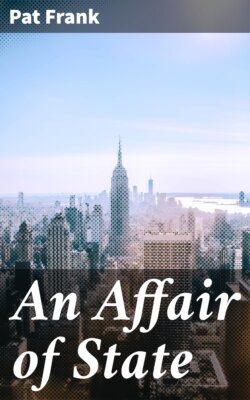Читать книгу An Affair of State - Pat Frank - Страница 5
На сайте Литреса книга снята с продажи.
[2]
ОглавлениеAt the corner of Fourteenth and H Streets he detoured into a cigar store. "I want a box--no, twelve will be enough--twelve of your best cigars," he told the man behind the counter. "Coronas or Havanas or whatever is the best." He never smoked cigars himself so he wasn't sure of the brands.
"Fifty centers?"
"Well, I don't know. You've got good quarter ones, haven't you?"
"Sure."
"Well, quarter ones will do." It wasn't so much saving three dollars, Nicholas thought. It was simply that it would appear ostentatious for a man in his position to pass out fifty centers. Fifty centers were for Assistant Secretaries, and Chiefs of Division, and Consul Generals, and FSOs in Classes One and Two.
He ran up the steps of the State, War, and Navy Building at five to nine and when he reached his office on the third floor, West Executive Avenue side, he was gratified to find that as usual he was first. He went to the closet to change his coat and was astonished to see his blue serge on the hanger. If his blue serge was on the hanger then he must be wearing his alpaca office jacket. He looked down and saw that this was true. He had been wearing the black alpaca all along, since noon the day before. This was very disconcerting. He was glad he was alone in the office.
Miss Grimsby, the red-haired stenographer, came in a bit after nine, and the others in Eastern Mediterranean not long after that, and then at ten Horace Locke arrived.
Mr. Locke accepted a cigar and pumped his hand. "Nick," he said, "you did it. You produced a boy. I'm proud of you."
"Thanks, Mr. Locke." He was senior to Horace Locke by six years, both in age and in the Department, and had given him his elementary instruction in tariffs, visas, admiralty law, code and cipher, and protocol. He had charted for him the often devious channels through which international gossip and information flowed into and through the Department. On both Horace Locke's tours of duty in Washington they had been in the same office, and shared the same work. Within this room they were friends. As men of comparable mentality and similar feelings they discussed the Department's policies and the great issues of the day--the peace treaties, the League, the Army's Siberian adventure, the disastrous strike of steel workers just begun and the threatened strike of coal miners within the next few weeks, the disquieting international organization called the Comintern formed in Russia, John Alcock's non-stop flight across the Atlantic, the new Volstead Act, and the HCL. But Horace Locke was a Foreign Service Officer, and Nicholas Baker was a clerk, and so it was always "Mr. Locke," and "Nick."
"What're you going to name him? Nicholas of course. He's your first."
"Well, my wife wants me to call him Nicholas." It seemed silly, to carry on a conversation like this. He couldn't imagine Horace Locke caring whether the boy was named Nicholas or Julius Caesar. Nicholas Baker was wondering whether it would be proper, and politic, to ask for the afternoon off when Mr. Locke took him by the arm and led him to his desk, so that the others in the room were excluded from what next he had to say.
"Nick," he asked, his long, handsome face suddenly sober, "did you hear the news?"
"No. What news?"
"The President had a stroke yesterday. In Wichita. Apoplexy."
"No!"
"Yes. It isn't generally known yet. I heard it from the Undersecretary last night at dinner."
"Do you think it's serious?"
"Apoplexy is always serious."
"I wasn't thinking of that, exactly. I was thinking of the League." Nicholas Baker had a theory, which he discreetly pushed when the moment was right, that the League would fail unless it was led by the United States, and there would be another war. He had another theory. It was too radical to voice openly. He believed that all the countries in the world should be formed into one government, as all the states were bound together in the United States.
"The League is finished, I'm afraid," said Mr. Locke.
"It's certainly finished unless the President is able to continue his speaking tour."
Mr. Locke shook his head. "It seems that our people are aroused and united only when they are immediately threatened. You take away their food, or their jobs, or put fear of sudden death into them--then they are aroused. But this League seems to them a faraway thing. It's like joining a lodge in another city. They don't see any quick benefit. They don't see how it can help them personally."
"But certainly they must think of their children."
"They don't think of their children. Only one generation in ten considers its children, and we had that generation in the last half of the Eighteenth Century. Anyway, Wilson's speaking tour will have to be cancelled. He can't possibly go on."
"It's a shame."
Mr. Locke sat down in his swivel chair and looked out of the wide window, over the White House, and over the Capitol beyond, so that the warm autumn sun was full on his face. "Poor Wilson," he said. "Poor, idealistic Wilson. What was it Jefferson said? It went something like this, 'The tree of Liberty must be refreshed from time to time with the blood of patriots and tyrants. It is its natural manure.'"
"It's always the patriots' blood. The tyrants never seem to bleed," Nicholas said.
"Well, that may be because most of us are patriots, really. So there are more of us to get hurt."
"Do you think so, honestly?"
"Yes, I do. The world is getting better. It must."
"Perhaps. We're due, and overdue."
